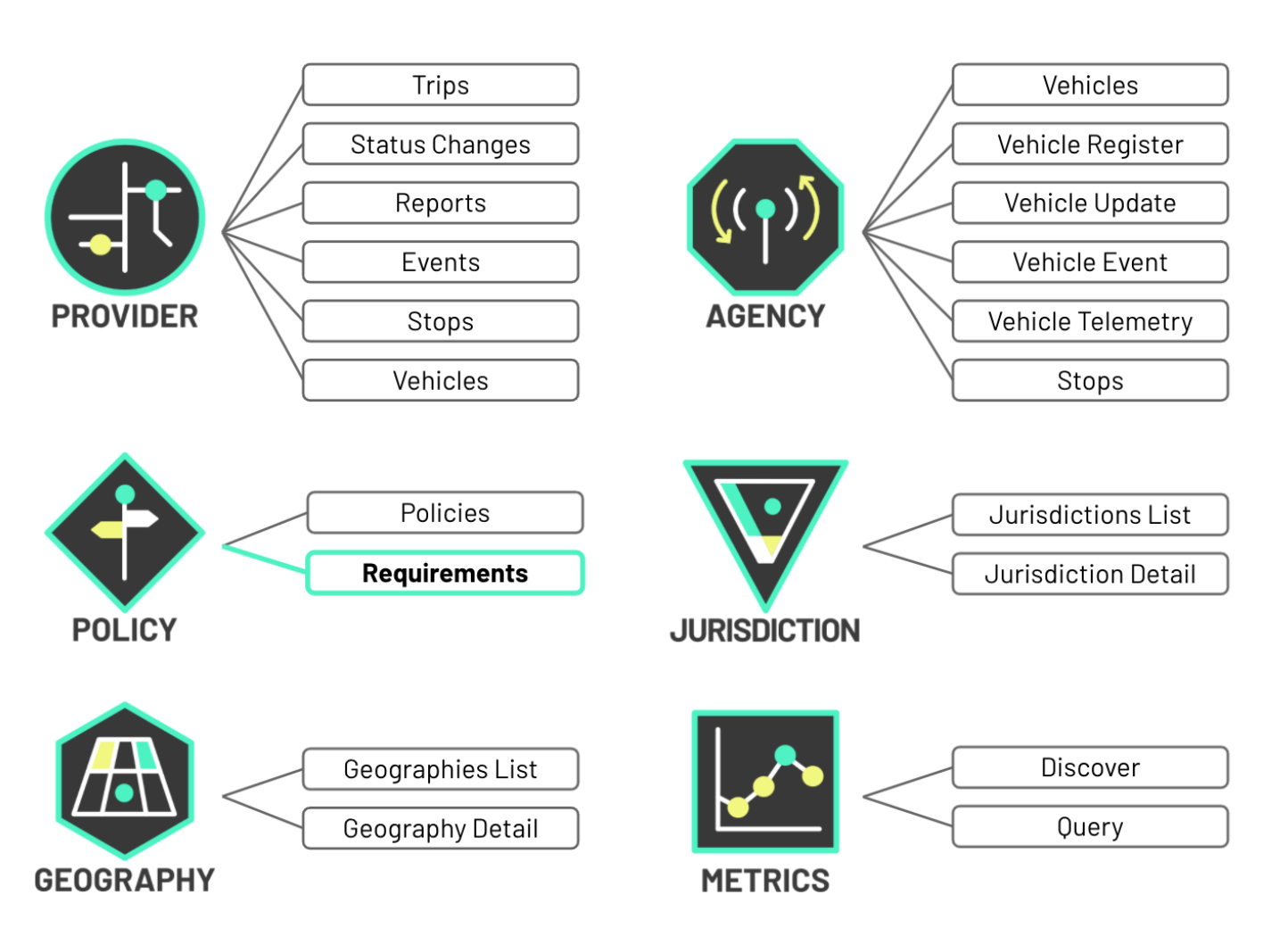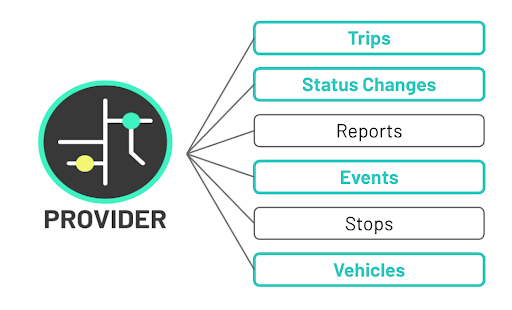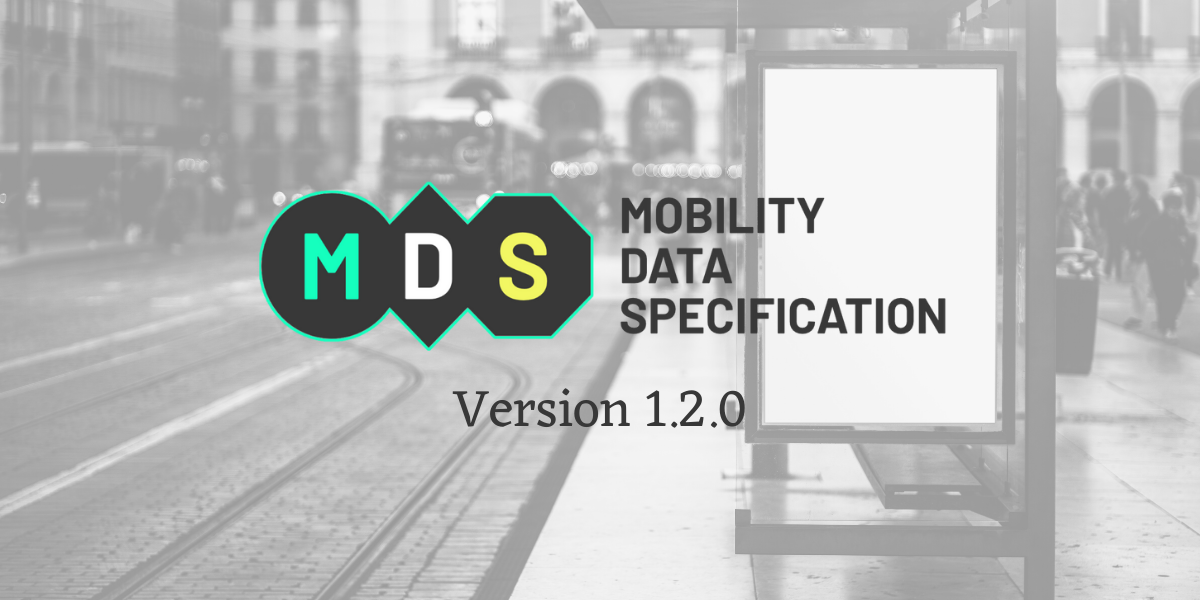After 10 months of development and review, MDS 1.2.0 is now live. This new version of MDS adds new features that improve accuracy and better support data privacy, adding digital program requirements, new options for policies, better GPS telemetry data, and more. Thank you to the community of volunteers that worked together to create this new release.

MDS Version 1.2.0 – New APIs and Endpoints
NEW FEATURES
Some specific feature highlights include:
Requirements
Digital expression of agency data requirements
This new endpoint in the Policy API allows agencies to express program data requirements digitally, allowing both operators and the public to see what MDS and GBFS versions, APIs, endpoints, and fields are needed.
At present, cities communicate data sharing requirements to providers through written regulations or other non-standardized formats. The new Requirements endpoint allows cities to publicly express their data requirements in a standardized, digital form. Cities can specify the parts of MDS, GBFS, and other specifications they intend to use, down to the level of specific APIs, endpoints, and individual fields. This new endpoint makes MDS even more flexible by letting agencies tailor the data they get to their specific use cases, and it increases privacy by allowing agencies to ask for only the data they need.
This new feature is currently in beta along with several other new features that have been added to MDS in recent releases. As with all beta features, the OMF encourages real world use and feedback to refine for future releases.

Example: City would like Provider trips, status changes, events, and vehicles only, but not Reports or Stops.
Policy Updates
Additions to the Policy API
In addition to the new Requirements endpoint, MDS 1.2.0 includes other improvements to the Policy API that support further digitization of city permit policy requirements. These updates are focused around improvements and clarifications to Policy, especially rates, a feature that was initially introduced in MDS 1.0.0 to allow cities to digitally express fees and other charges for operators.
Telemetry Details
More metadata around GPS telemetry accuracy
Adding telemetry details like GPS accuracy and speed data provides more complete information about the reliability of GPS points. These new fields are optional, and not all providers have this level of detail available from their vehicles. By incorporating additional information about GPS accuracy, more realistic historical analysis of route data can be conducted.
Vehicles
Moving the Vehicles endpoint out of beta
Most agencies, providers, and companies support the Vehicles feature, based on OMF’s State of MDS survey. In this latest release, some necessary clarifications and refinements were made to move the feature out of beta. These clarifications were specifically around the jurisdiction definition and ROW language, and to create more alignment between MDS Vehicles and GBFS, including the addition of a cargo bike vehicle type. Learn more about how to use the Vehicles endpoint here.
STAYING CURRENT WITH MDS
The release and full notes may be viewed on Github. To learn more about how MDS – including various APIs and endpoints – is used, check out our use case database.
New version releases are a good time to assess which version of MDS your organization is using, and consider upgrading to the most current version. Staying up-to-date with the most current version of MDS has multiple benefits, including more accurate data, access to improved features and support, and a more effective data standard overall. Get specific guidance on MDS versions, including an overview of key features, here.
GETTING INVOLVED
Thank you again to the diverse group of community members who contributed to the release, including pull request creators (Blue Systems, Compiler, E&A, Populus, Superpedestrian), issue creators (Ride Report, Populus, SPIN, Vianova), and commenters (Blue Systems, Compiler, E&A, Hyperknot, City of Los Angeles, MobilityData, Nivel, Populus, Ride Report, Seattle DOT, SFMTA, SPIN, Superpedestrian, Vianova), plus the the dozens of individuals and organizations that participated on our weekly working group calls.
The OMF’s MDS Working Group will continue to improve the specification as we plan for version 2.0. The working group is currently discussing further enhancements to the Policy API, and is laying the architectural groundwork to add new modes to MDS, such as personal delivery devices (delivery robots), free-floating car share, and taxis.
To participate in the evolution of MDS:
- Review the MDS Working Group wiki to familiarize yourself with the group’s work
- Get announcements and review meeting agendas from the MDS mailing list
- Join bi-weekly meetings (Thursdays, 12pm ET) to discuss issues and hear from other contributors
- Follow progress and chime in on our MDS repository




